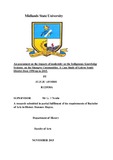Please use this identifier to cite or link to this item:
https://cris.library.msu.ac.zw//handle/11408/2060| Title: | An assessment on the impacts of modernity on the indigenous knowledge systems on the Shangwe communities: a case study of Gokwe south district from 1950 up to 2015. | Authors: | Jujuju, Admire | Keywords: | Indigenous knowledge systems | Issue Date: | Nov-2015 | Publisher: | Midlands State University | Abstract: | The history of the Shangwe of Gokwe South District has been discovered by many scholars. Though, my study unloaded the history of the Shangwe people of Gokwe South District mainly on the indigenous knowledge systems and how colonialism and imperialism have affected the Shangwe communities and their IKS. The investigation has shown the effects of the Shangwe displacements by the Rhodesian government and also the effects caused by the immigrants (Madheruka) who came from other regions of Zimbabwe from the 1950s. This study discovered that the Shangwe were colonised socially, politically and economically by the Rhodesia settlers which caused the underdevelopment of the Shangwe communities in Gokwe South District. The Shangwe indigenous Knowledge systems were destroyed by their evictions and influx of the immigrants (Madheruka) who had a different culture and religious practices to that of the Shangwe. The Shangwe IKS was highly influenced by the Religious beliefs and practices which were on the centre stage of the economic, social and political practices of the indigenous people of Gokwe South District. This research have discovered that African Traditional Religion which was practiced by the Shangwe had a pivotal role in influencing their practices in areas like agriculture, hunting, conservation education and in medical knowledge systems. The Shangwe Indigenous Knowledge systems were affected by the colonial evictions or displacements from the Mafungautsi State forest, influx of the Madheruka in Gokwe and the colonial policies which was not in line with the Indigenous ways of living. The Rhodesian government had introduced policies which promoted the British direct and indirect rule as well as their successful exploitation of the region of Gokwe South. The colonial and imperial policies have direct and indirect impacts on the Indigenous Knowledge Systems of the Shangwe people. The resettlement schemes introduced by the Rhodesian government had forced the Shangwe to accept the Madheruka hegemony and supremacy. The influx of the Madheruka has seen the Missionaries in the region spreading their Christianity. The Missionary activities highly affected the Shangwe Indigenous Knowledge Systems since it disturbed the cultural practices, indigenous education, and indigenous medical practices in the region of Gokwe South District. The colonial government introduced the cash crop production which went a long way changing the economic activities of the Shangwe, hence the underdevelopment of IKS and the Shangwe communities from the 1950s. Despite the racial and colonial onslaught on the Shangwe of Gokwe South District there are some Indigenous Knowledge practices which have survived and are still being practiced in the region alongside the imperial practices and this system can be regarded as acculturation. | URI: | http://hdl.handle.net/11408/2060 |
| Appears in Collections: | Bachelor Of Arts In History Honours Degree |
Files in This Item:
| File | Description | Size | Format | |
|---|---|---|---|---|
| JUJUJU ADMIRE.pdf | Full Text | 1.25 MB | Adobe PDF |  View/Open |
Page view(s)
134
checked on Dec 20, 2025
Download(s)
180
checked on Dec 20, 2025
Google ScholarTM
Check
Items in MSUIR are protected by copyright, with all rights reserved, unless otherwise indicated.



